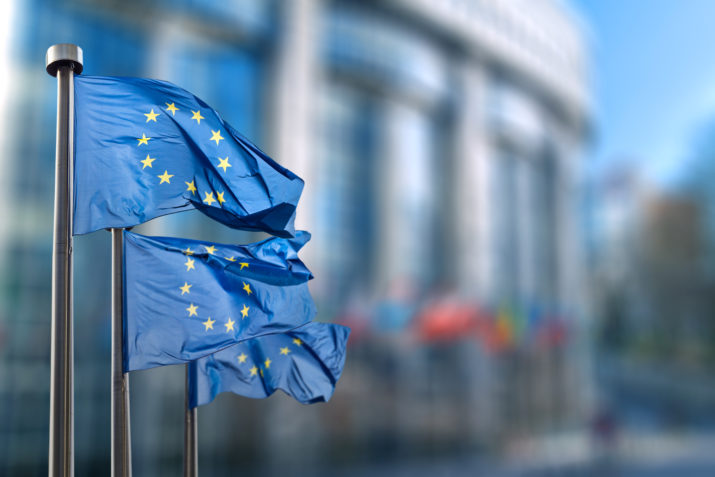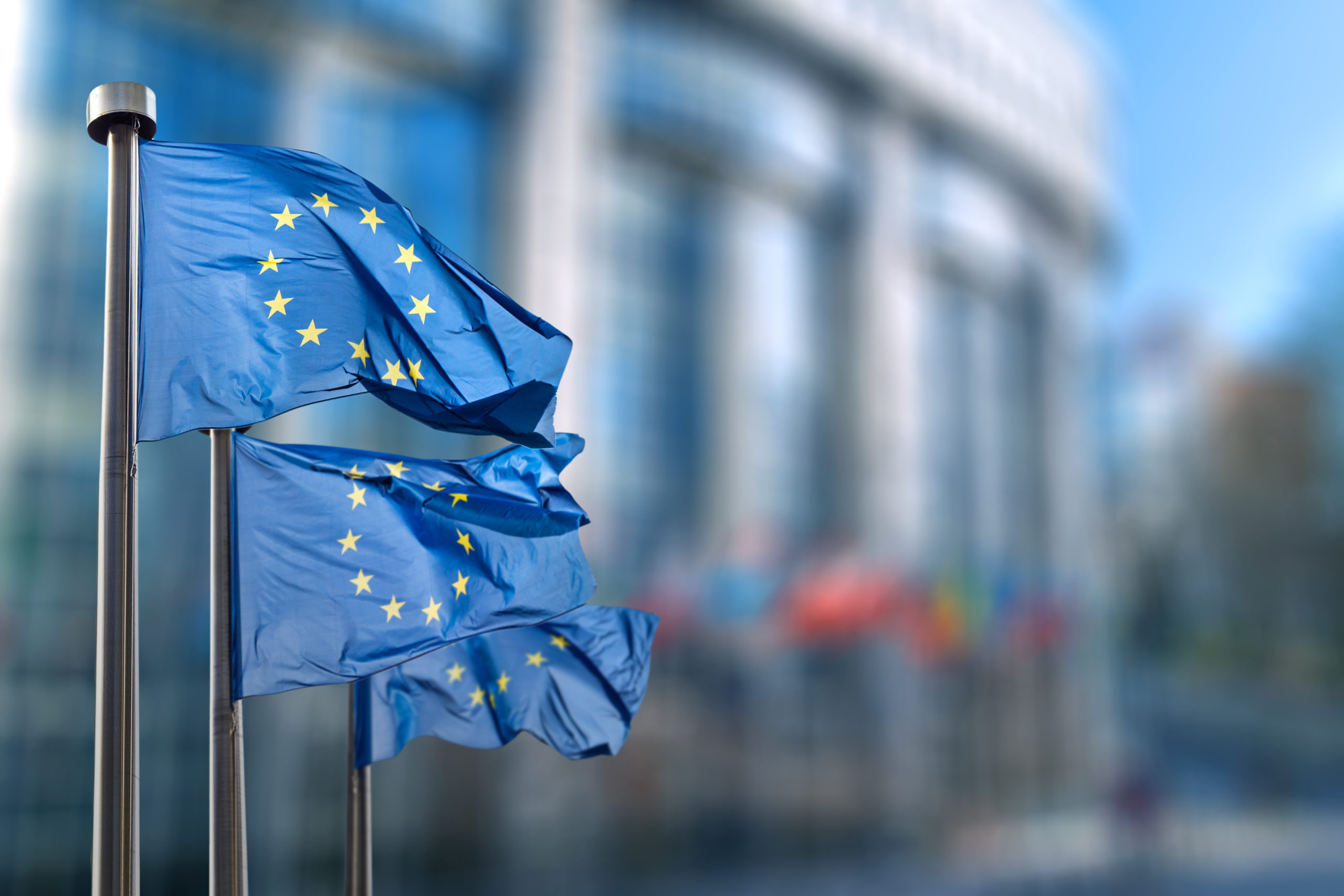
European Studies at European University Viadrina in Frankfurt (Oder): Critical, Interdisciplinary, and International

This is part of our Campus Spotlight on Europa-Universität Viadrina.
For more than twenty years, students from Germany, Poland, France, Turkey, and many other countries in Europe and the world have come to Frankfurt (Oder), on the German-Polish border, to take up a unique Master’s (MA) program in European Studies. The Master in European Studies at European University Viadrina (EUV) offers a multi-lingual, interdisciplinary, cross-faculty MA curriculum, in which students acquire a broad and foremost critical view of cultural, political, economic and legal developments in Europe and the European Union. As opposed to many other programs in this field, the program strives to challenge the consequences and discrepancies resulting from these developments, rather than solely affirming the process of European integration. For example, classes focus on positive and negative effects of Europeanization or reflect on European politics from an outside perspective, as well as on the consequences of European integration.
The interdisciplinary approach to European Studies allows students to acquire basic knowledge in European affairs in four disciplines and sub-disciplines―European history, the politics of European integration, the European economic system, and the European legal system―taught by faculty of the three different departments at Viadrina University: Law, Cultural and Social Studies, and Economics. In addition, depending on their undergraduate degree, students are assigned to a certain major in one of these research areas. However, students are also encouraged to choose fields of studies according to their interest, thus allowing for personal flexibility between disciplinary and interdisciplinary focus. They can choose freely from six interdisciplinary modules that are organized thematically. Here, questions of migration, gender and ethnicity, or urban developments for example are approached from a legal, social, political and economic angle. In these modules, it is also possible to focus on a certain country or an area in Europe without having to limit oneself to only one academic discipline.
Mirroring an important aspect of Viadrina’s founding charter, the European Studies program is highly committed to international education and cooperation. Studying at a national border with classes offered on both its German and Polish sides is a unique part of the program’s international character. Students interested in Central Eastern and Eastern European countries are right where they belong: “Spearheads of ‘Civil Society’?” “Dissent and Opposition in Poland and East Central Europe in the 1970s and 1980s,” “Belarus and Ukraine: Historical and Trajectories and Post-Soviet Transformations” and “The Balkan region as a ‘double transit area:’ From countries and migrants on the long way to the EU” represent just a small excerpt of the current curriculum.
While lectures are delivered mostly in German, the program offers classes in English, Polish, and French every semester. Studying one modern European language is part of the program curriculum. Many of the students take advantage of Viadrina’s broad network of international partner institutions and spend one or two semester(s) at a university in another European country or at important centers of European Studies in North America, Latin America, and Asia. Ambitious students can engage in double degree programs with universities in Poznan (Poland), Strasbourg (France), and Istanbul (Turkey), all of which have a reputation for being leading institutions for the study of European Studies. Last but not least, regular visits by international guest lecturers from all over the world add diversity and international expertise to the geographic and thematic focus of our curriculum.
Both the interdisciplinary and international orientation of the MA program reflects in the widely different, but not less relevant, research topics students choose for essays, papers, and their final dissertation. Topics range from party group coherence in the European Parliament, visa policy and international market integration at EU level in the case of Macedonia and the Ukraine, the Europeanization of Turkey’s Kurdish Policy, to the concept and impact of social housing programs in Rio de Janeiro, or the economic development and crosslinking of knowledge in the Pyrenees. In most cases, dissertations are written in English or German, but, especially in the context of the double degree programs, students sometimes choose French or Polish. Committed to the interdisciplinary character of the program, outstanding projects on up-to-date issues of political, economic, and legal developments of the European integration process are published by the MA program in its own publication series.
While the degree qualifies its graduates to pursue―if desired―an academic career, the program also puts a strong emphasis on conveying practical experience. This is reflected in a course catalogue that offers simulation games and classes on political consulting or political journalism. Moreover, our external teaching staff consists of former professionals from EU institutions or former employees of the European Commission, who share their many years of experience inside the EU with students. In such courses, students deal with the more practical aspects of policy making at EU level, looking deeper into, inter alia, economic, ecological, and legal questions while basing their research on case studies in the fields of competition and trade, climate protection, digital agenda, or the reduction of bureaucracy. Throughout these courses, students benefit from personal insights, first-hand experiences, and professional knowledge of these high-ranking faculty.
Additionally, an internship in a field of students’ professional interest is an integral part of the program. In the past, students have taken up internships in EU institutions, national and regional government and administration, (international) NGOs, consulting agencies or media and cultural institutions. The broad range of internship opportunities reflects the diversity of Viadrina’s student body. While some of them come to study European Studies at Viadrina with a clear goal of working in an EU institution after graduation, the majority has other plans. Some of these plans include working for NGOs, national and international education institutions and foundations, cultural and political institutions, European and international companies, in the field of political education, journalism, political consulting, or at the interface between economics and politics.
As only thirty students take up the European Studies program every semester, they benefit from comfortable study conditions, in small class setting with individual guidance by faculty and administrative staff, as well as an informal atmosphere on campus. Even after graduation, people in the program keep in touch with alumni through regular newsletters, alumni events, or even through their participation in the curriculum―several have already offered practical classes focused on their field of work. This participation might include working on the next issue of a political journal whose editor-in-chief is a program’s alumnus or engaging in simulation games on current political and social issues that aredesigned interactively by former students now working as educational trainers.
Here is an example of a Module Structure for the program:

Kerstin Hinrichsen is Coordinator of the Master’s Programme in European Studies at European University Viadrina in Frankfurt (Oder). She completed a PhD in history, researching the German-Polish border region after 1945.
Photo: EU Flag | Shutterstock
Published on June 3, 2020.




